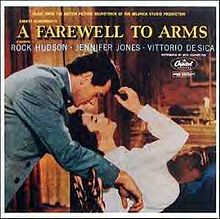 Hollywood made two movie adaptations of Hemingway’s novel published in 1929, which was based on his younger days in Italy as a Red Cross volunteer in World War I in 1917. The first was made in 1932 and starred Gary Cooper; the flashy remake was made in 1957 after the war, during a prosperous time for Hollywood, and Rock Hudson performed the lead role.
Hollywood made two movie adaptations of Hemingway’s novel published in 1929, which was based on his younger days in Italy as a Red Cross volunteer in World War I in 1917. The first was made in 1932 and starred Gary Cooper; the flashy remake was made in 1957 after the war, during a prosperous time for Hollywood, and Rock Hudson performed the lead role.
Italy formed an alliance with Germany in World War II, but they were a member of the Allies in World War I –along with France, Great Britain, Russia, and the U.S.—and fought against Austria, Germany, and Turkey of the Central Powers. The protagonist Henry, a projection of Hemingway, is a soldier of the U.S. forces who serves as an ambulance driver to transport injured Italian soldiers from the battlefield to the hospital. The German and Austrian armies were dominant militarily, and Italy always felt threatened by the Central Powers’ forces because, while Italy concentrated on establishing a democracy, Germany focused on expanding their military; Hemingway’s A Farewell to Arms favorably depicts Italians, who proudly hold onto and protect their republic and democracy. However, over time, Italy kept moving toward fascism, allying with Germany before World War II. Hemingway, who constantly watched Italy, may have later wondered, “Where has Italy gone?” Although Mussolini was extremely popular after World War I, it is said that Hemingway was wary of Mussolini. In this story, the Italian military police suddenly interrogate fellow Italians suspected of being spies, who are one after another shot to death without being allowed a hearing. The protagonist barely escapes alive and becomes a deserter; the interrogation scene symbolizes Italy’s path to World War II.
Let’s return to talking about the 1957 movie remake. Rock Hudson somewhat resembles London Olympics gold medal swimmer Ryan Lochte, and he has a “pretty face,” but is unable to capture Hemingway’s intellect or ruggedness. Jennifer Jones—performing as the nurse who cares for and falls in love with the protagonist when he is injured—looks as if you added the duller halves of Elizabeth Taylor and Audrey Hepburn together; she doesn’t have the alluring eye power of Elizabeth Taylor, and she also doesn’t have the sweet innocence of Audrey Hepburn. Jennifer Jones, if I say it nicely, is too sexy, but if I say it bluntly, doesn’t seem to possess the purity needed for this character. Also, the two people are supposed to be “madly in love” in the movie, but there is no spark at all between them on-screen, so the love between the two during this dangerous wartime does not emotionally move me at all.
In the hospital ward that should be packed full of sick and wounded soldiers, the protagonist is always laying there alone in a big, empty room, which makes me wonder, “What happened to the other sick and wounded soldiers?” The nurse who should be busy helping many patients instead spends all day running around an Italian town searching high and low for American food that the protagonist likes. In the protagonist’s private (so it seems!!) hospital room that nobody disturbs, the two are preoccupied with their love affair, as if the world just exists for the two of them; then the head nurse who notices this orders, “If you are so healthy, return to the battlefield!!!” Although, the head nurse is supposed to be a super-villain who obstructs the two lovers, the two lovers are so self-centered that the head nurse seems like a decent person. This movie ends with the feeling that it doesn’t really matter how the war turns out, since the world conveniently revolves around them.
It is said that Hemingway was disappointed with how each time Hollywood adapted one of his stories into a movie, the political themes in his novels got watered down and they became simple love stories; this movie makes me think that his anger was completely reasonable. The audience of Hollywood movies is not stupid. This glamorous remake had an astonishingly high budget and was filmed on the actual site, but it is said that it was a failure in the box office, and it received very low ratings compared to the 1932 movie, which was nominated in many Academy Award categories. It is said that Jennifer Jones—a big actress in those days—asked her lover, director Charles Vidor, “Can I please star in another A Farewell to Arms?” I don’t know whether or not Hemingway watched this movie, or what he thought if he did watch it, but this movie makes me feel sorry for him.
